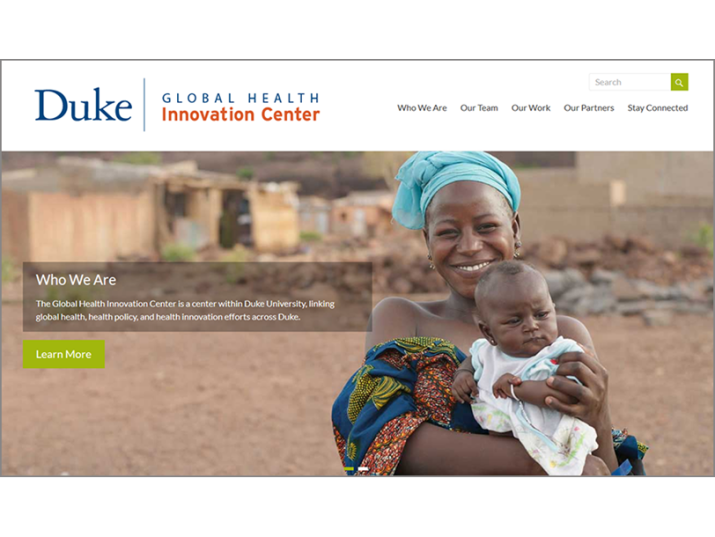
Visit the GHIC website (dukeghic.org) to learn more about this new center.
Published September 19, 2017, last updated on June 3, 2020 under Research News
This summer, DGHI and partners across Duke launched the Duke Global Health Innovation Center (GHIC) to study and support the scaling and adaptation of health innovations, and related policy reforms, to address critical health challenges worldwide. Krishna Udayakumar, associate professor of global health and medicine and executive director of Innovations in Healthcare, leads the center.
The seventh center established at the Duke Global Health Institute (DGHI), the GHIC is a joint initiative with the Duke-Margolis Center for Health Policy and the Duke Institute for Health Innovation. It will support health innovation through links to health policy reforms and integration with health innovations at Duke.
The center will also serve as an academic base for faculty, staff, trainees and students working on health innovation and policy globally. Education and training opportunities will include fellowships, post-doctoral appointments, student mentoring, internships and new academic courses.
“With enduring challenges to improving health globally, in addition to evolving threats like rapidly growing rates of non-communicable diseases, there is an urgent need to curate and scale the best innovations around the world in order to meet critical health needs,” said Udayakumar.
“The Duke Global Health Innovation Center will bring together the resources and capabilities of a leading university and academic health system to lead the way in addressing real-world health challenges through new solutions that impact heath policy, payments, and care delivery.”
GHIC Strategic Priorities Address Innovation from Multiple Angles
The GHIC has established key strategic priorities, including:
- The curation and scaling of health and healthcare innovations globally through research and analysis, education and training, capacity building and advocacy;
- Support for adaptation of innovations across systems and countries by integrating resources and capabilities across global health, healthcare innovation and health policy to develop and strengthen multi-disciplinary approaches; and
- More rapid development, scaling and adaptation of health innovations by identifying and advancing effective policy, regulatory and financing reforms.
The GHIC will work closely with Innovations in Healthcare, a Duke-hosted non-profit organization that was co-founded by Duke, McKinsey & Company and the World Economic Forum in 2011 to scale healthcare innovations worldwide. The work of Innovations in Healthcare over the past six years has set the foundation for the GHIC’s establishment and success.
“The global health landscape is changing rapidly, and innovation has become an essential element for reducing health disparities,” said Randall Kramer, interim director of DGHI. “The GHIC will provide an exciting platform for faculty and students to study and learn about healthcare innovation and related policy.”
GHIC Has Hit the Ground Running
Although the GHIC was officially established in July, Udayakumar and his colleagues have been ramping up center activities over the past year. They have already secured external funding commitments from a number of funders, mentored five medical, graduate and undergraduate students through projects and internships, presented research findings in the United States and across the world, submitted multiple articles to peer-reviewed publications, and initiated collaborations with faculty members and trainees from various academic areas across Duke.
In one of its current projects, Regional Action through Data (RAD), the GHIC is working with partners such as BroadReach Healthcare and the West African Health Organization (WAHO) to address the problem of limited availability and use of data to drive improvements in health service delivery and health policy-making in Sub-Saharan Africa. The GHIC is also a key partner in the African Collaborative for Health Financing Solutions (ACS), a collaboration with Results for Development (R4D) and Feed the Children to advance universal health coverage (UHC) in sub-Saharan Africa. Both projects are supported by USAID.
In addition, a joint project between the GHIC and Duke-Margolis, supported by The Commonwealth Fund, is supporting adaptation of global innovations in policy and healthcare delivery to address critical health challenges for high-need, high-cost populations in the United States.
“The GHIC builds on a successful portfolio of funded research and policy work involving key thought leaders from the Duke Global Health Institute and Duke-Margolis,” said Mark McClellan, Duke-Margolis director. “We have gained national and international recognition for our work in two-way translation of health policy solutions between the U.S. and global contexts and in advocating for integrated policy, payment, and delivery innovations to address some of the world’s most compelling problems like rapid growth of non-communicable diseases. We look forward to leveraging Duke’s strengths in global health and health policy through innovation.”
Next Steps for the GHIC
This coming year, in addition to overseeing the implementation of current and emerging projects, the GHIC team will establish a faculty advisory committee, grow the number of faculty members and create new educational opportunities for students and trainees.
Building strategic partnerships within and beyond Duke will be a key priority for the GHIC. For example, center leaders and members are exploring opportunities to support Duke Health’s own health innovation efforts in areas such as population health and telemedicine, closely linking local and global efforts for shared learning. They are also engaging with leading United States providers, payers, policy makers, and change agents such as the Institute for Healthcare Improvement.
Global collaboration will be another vital component of the GHIC’s success; they are partnering with organizations such as the World Innovation Summit for Health in Qatar, Duke-NUS Medical School in Singapore, leading social enterprises worldwide, and multinational corporations, in order to accelerate the uptake of innovations to solve complex global health problems.
“This is an exciting time to be at Duke working on health innovation and policy globally,” said Udayakumar. “I’m honored to be able to lead the Duke Global Health Innovation Center as we take on the most pressing challenges in health and improve people’s health and lives around the world by harnessing the power of innovation.”


